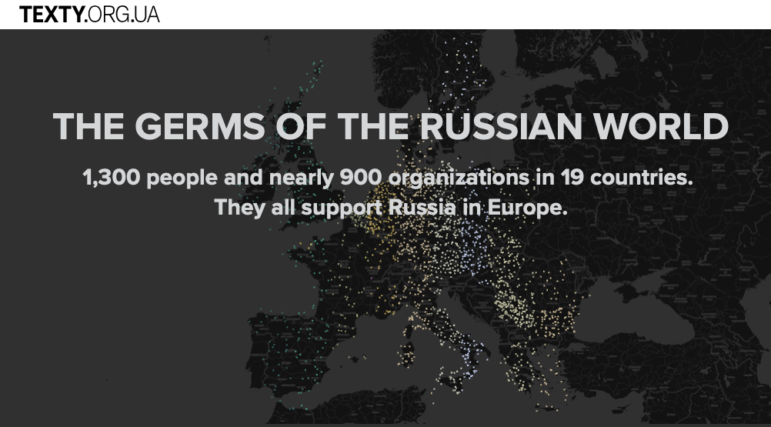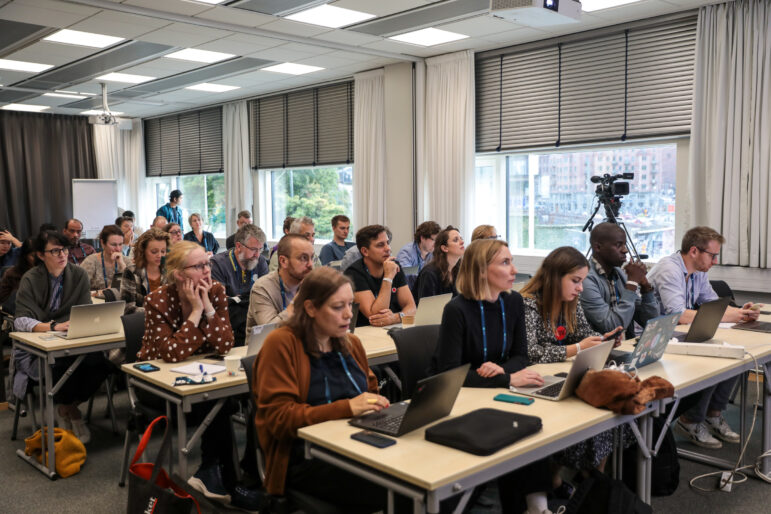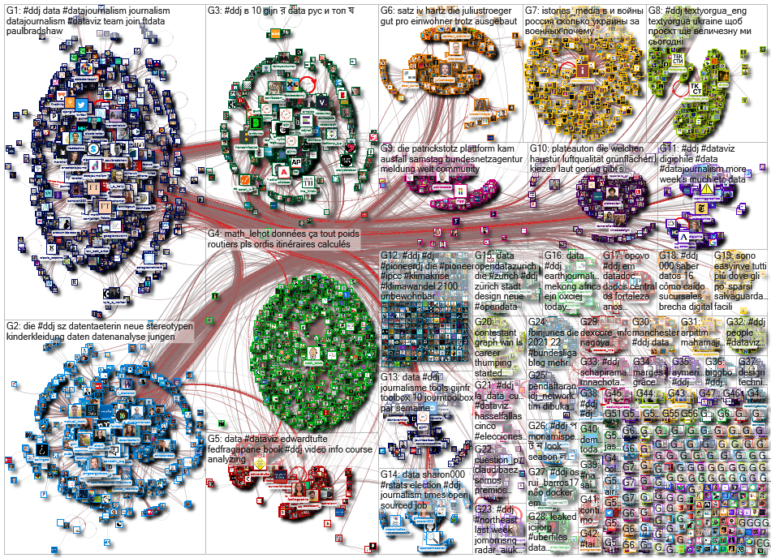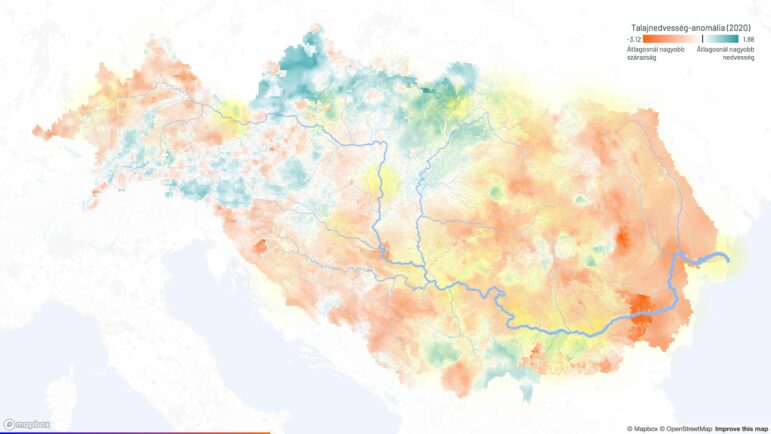

Украинский дата-проект «Тексты» Texty использовал открытые источники для создания карты о потенциальных агентах России в Европе. Изображение: Texty.org.ua
Editor’s Pick: Top 10 Data Journalism Projects from 2022
Read this article in

The Ukrainian data site Texty used open source research to create a continent-wide map of Russian-supporting individuals and groups across Europe. Image: Texty.org.ua
Russia’s invasion of Ukraine dominated the headlines and the work of data journalists worldwide for most of 2022. From Russian exports to its military losses and sanctions, and from Ukrainian refugees to defense strategies and empty skies, data teams have tackled and analyzed a myriad of topics related to the war waged by Russia. As a reminder of how the war stood in late February, here’s a throwback look at the early maps created by nearly 50 newsrooms.
Other pressing issues also garnered global attention: climate change and extreme weather events, destruction of the Amazon rainforest, protests in Iran, COP27, the World Cup, and the overturning of abortion rights in the United States. On the political front, people focused on China as Xi Jinping engineered a third term as leader of the ruling Communist Party, the French election saw Emmanuel Macron reelected, the United Kingdom had a flurry of prime minister changes, and, in Brazil, former Brazilian president Luiz Inácio Lula da Silva, known as Lula, defeated incumbent Jair Bolsonaro.
Using NodeXL’s analysis of the most popular data stories on Twitter, plus a good dose of human curation, we feature the best data stories weekly in our Data Journalism Top 10 columns. To mark the end of the year, we have selected our top 10 projects of 2022, featuring a look at Russia’s global influence, uranium pollution, water market ownership, and more.
Russian Influence Networks
It would be impossible to pick one data journalism piece to highlight the stellar work of data journalism teams in 2022 to document Russia’s attack on Ukraine. So we have chosen to highlight the body of work done by Ukrainian data journalism agency Texty.org.ua in this space, as its stories have been a regular feature of our column. In its latest story using open sources, Texty.org.ua investigated Russian influence networks in Europe. It published a beta list of 1,300 individuals and nearly 900 organizations in 19 countries which they suspect support Russia’s objectives in the continent. Among the groups: clubs, associations, and educational institutions. Among the people: various public figures from local politicians to professors and religious figures. Other notable works in Texty.org’s portfolio: an interactive map on Russian shelling, its satellite monitoring of Russian military bases, and an analysis of most-discussed war topics based on popular memes.
Uranium Legacy: Pollution and Sickness
The Cold War nuclear arms race saw a boom of uranium mills in the United States, most of which closed by the mid-1980s. According to ProPublica’s review of thousands of pages of government and corporate documents, site visits, and interviews with 100 people, the government’s efforts to cleanup the toxic byproducts from the country’s 48 uranium mills and seven processing sites have been problematic. The nonprofit newsroom highlighted state agency reports that document elevated cancer risks among residents living near these sites. It also reported that at least 84% of these sites have polluted groundwater.
Offshore Water Owners
Control over a nation’s water resources is crucial for a country’s economic and social health. Surprisingly, an investigation by the Guardian found that a significant chunk — at least 72% — of England’s water resources are controlled by private, offshore investors. By tracking the shareholders of water companies in the country, journalists were able to determine the parent owners of England’s water market, which include an investment fund in the US, two pension funds in Canada, and corporations based in seven Asian countries.
Congressional Slaveholders Database
The Washington Post created a first-of-its-kind historical database cataloging more than 1,800 members of the US Congress who once owned slaves. By examining thousands of pages of census data and other historical documents, such as wills, journals, and plantation records, The Post was able to identify slaveholders across 40 states who were in office from 1789 to 1923. Find the data here on Github.
Unlivable Earth
Climate models predict that by the year 2100, many places on earth will become uninhabitable as a result of extreme weather events caused by climate change. Berliner Morgenpost’s interactive team FUNKE Interaktiv mapped on a rotating three-dimensional globe the areas where populations will suffer from extreme heat, water stress, rising sea levels, and tropical cyclones by the end of this century. The piece, which picked up an Online Journalism Award for Excellence and Innovation in Visual Digital Storytelling, is available in English, and in German.
https://twitter.com/benjazehr/status/1564660443121127424
Caesarean Delivery Rates in Spain
The rate of caesarean sections across 360 public and private hospitals in Spain varies widely, and for the first time, that information is available in a searchable database created by elDiario.es. By cross-referencing open data sources with the anonymized records on C-section deliveries released by the country’s Ministry of Health, the online news site was able to determine which data corresponded to which hospital. Reporters found that 28 hospitals had a C-section rate of more than 45%, roughly triple the rate recommended by the World Health Organization.
https://twitter.com/iboneolza/status/1581926161126690821
Haiti’s Lost Billions
In this impressive historical investigation, The New York Times took a deep dive into academic research, financial reports, government budgets, archival ledgers, and more to document how Haiti was forced to pay reparations to its former French master in order to keep the nation’s independence. Journalists estimated the extraordinary financial losses by Haiti over the last two centuries as a result of this debt, and explored the devastating effects it has had on the country’s people, infrastructure, and economy.
No-Bid Contracts in Latin America
The Network of Journalists of Latin America for Transparency and Anticorruption (Red Palta) investigated how public resources are invested in medications in Central and South America. Thanks to freedom of information requests and public databases, the collaborative group accessed and analyzed mental health sales contracts signed between 2017 and 2021 in five countries: Argentina, Chile, Guatemala, Peru, and Uruguay. According to the information obtained, the majority of psychotropic drugs are acquired in processes that only have single bidders, or where subsidiaries of the same group participate.
Polarization of COVID-19 Vaccination
Vaccines have been pivotal in our fight against the COVID-19 virus. But Vox documented a notable minority in the US who chose not to be vaccinated despite evidence of its effectiveness. Using 15 charts spliced with interviews, Vox produced a simple but ingenious explainer of the vaccination gap between American conservatives and liberals. It also highlighted that misinformation and disbelief over the seriousness of the pandemic were two of the reasons behind vaccine hesitancy.
Misrepresenting Women in the News
Women tend to be featured in the news less compared to men. And according to research by The Pudding, when females are mentioned in the headlines, the language used is often more sensational and reinforces existing stereotypes. The longform data journalism site analyzed 382,139 news headlines between 2005 and 2021 from four countries to find out the language patterns and common themes or words used in women-centered headlines and how these trends have (or have not) changed over time.
Bonus: Debates
The data journalism community has been pretty vocal on Twitter this year. Here are three memorable topics of discussion: Who can forget the spiral graph on the COVID variant waves created by The New York Times that sparked heated online debate early this year? If you missed the commotion, catch up here. There were also debates on how to accurately map politically sensitive areas in Ukraine, and how to best portray what’s happening on the ground with Russia’s invasion.
Bonus: Games
This year we featured a number of interesting news games in our column, which could make for a fun revisit during the year-end holidays. Here’s a round up of our favorites: The Washington Post designed an interactive mini-golf game based on the often-ridiculous shapes of US Congressional districts. The New York Times challenged readers to gerrymander their political party to power in this draw-it-yourself game. The Financial Times tested your ability to make wise policy decisions to cut carbon emissions to net zero by 2050. And finally, German newspaper Berliner Morgenpost created a Tetris-like game for readers to find out whether their way of life emits more than the climate budget allows.
Thanks again to Marc Smith and Harald Meier of Connected Action for gathering the links and graphing them. GIJN’s Data Journalism Top 10 list will be on break till Jan. 13, 2023.
 Eunice Au is GIJN’s global team manager. Previously, she was a Malaysia correspondent for Singapore’s The Straits Times, and a journalist at Malaysia’s New Straits Times. She has also written for The Sun, Malaysian Today, and Madam Chair.
Eunice Au is GIJN’s global team manager. Previously, she was a Malaysia correspondent for Singapore’s The Straits Times, and a journalist at Malaysia’s New Straits Times. She has also written for The Sun, Malaysian Today, and Madam Chair.









